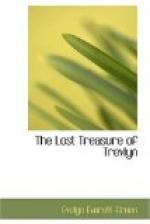Robin had not been at the mill the night that Cuthbert had been brought there by Tyrrel and his companions. Joanna had described him so graphically that the lad was certain of knowing him were he to come across him in the forest. She had also indicated to him the region in which she suspected him most generally to lurk when he spent days and sometimes weeks alone in the forest. She believed that during the summer months, when the forest became the resort of many wandering bands of gipsies or of robbers and outlaws, he kept a pretty close and constant watch upon the spot where his treasure lay hid. The dell, at the head of which the bones of the seven murdered men had been found, was certainly a favourite spot of his; and she believed it was owing to some trickery of his that men still declared it haunted by evil or troubled spirits. Travellers passing that way had been scared almost out of their senses by the sight of a ghostly white figure gliding about, or by the sound of hollow moans and the rattling of chains. None but the ignorant stranger ever ventured within half-a-mile of that ill-omened spot. Cuthbert, as he sat thinking over the gipsy’s words and charge, saw clearly that there was ample room for suspicion that here the treasure might lie, since Robin took such pains to scare away all men from the spot.
The light burned dim; but Cuthbert still sat on beside the rude table where he had supped. Before him lay the scrap of parchment with the doggerel lines of the wise woman inscribed upon them. It had been something of a shock to his faith to find that the wise woman knew all his story beforehand, and had had no need to dive into the spirit world to ask the nature of his errand. He felt slightly aggrieved, as though he had been tricked and imposed upon. He was very nearly burning the parchment in despite; but Joanna had bidden him keep it, and had added, with a slight significant smile:
“Keep it, boy; and think not too hardly of those who juggle with men’s fears and fancies, to obtain the greater sway upon them. It is not always used amiss. As for those lines, there may be more in them yet than thou or I can see at this moment. For there may be words in them that have been spoken by Long Robin in his dreams. Esther has told me such before now. She knew not their meaning, nor do I; but that they have a meaning she is very sure. ’Three times three’—that was what he was muttering ever. It was the burden of his thought, even as she made it the burden of her song. Keep the lines; they may serve thy turn yet. Esther is a wise woman. She did not give thee that paper for naught.”




